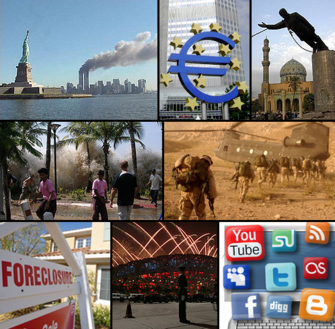Portal:2000s
The 2000s Portal The 2000s (pronounced "two-thousands") was a decade that began on January 1, 2000, and ended on December 31, 2009. The early part of the decade saw the long predicted breakthrough of economic giants in Asia, like India and China, which had double-digit growth during nearly the whole decade. It is also benefited from an economic boom, which saw the two most populous countries becoming an increasingly dominant economic force. The rapid catching-up of emerging economies with developed countries sparked some protectionist tensions during the period and was partly responsible for an increase in energy and food prices at the end of the decade. The economic developments in the latter third of the decade were dominated by a worldwide economic downturn, which started with the crisis in housing and credit in the United States in late 2007 and led to the bankruptcy of major banks and other financial institutions. The outbreak of this global financial crisis sparked a global recession, beginning in the United States and affecting most of the industrialized world. The decade saw the rise of the Internet, which grew from covering 6.7% to 25.7% of the world population. This contributed to globalization during the decade, which allowed faster communication among people around the world;[1][2][3][4][5] The war on terror and War in Afghanistan began after the September 11 attacks in 2001. The International Criminal Court was formed in 2002. In 2003, a United States-led coalition invaded Iraq, and the Iraq War led to the end of Saddam Hussein's rule as Iraqi President and the Ba'ath Party in Iraq. Al-Qaeda and affiliated Islamist militant groups performed terrorist acts throughout the decade. The Second Congo War, the deadliest conflict since World War II, ended in July 2003. Further wars that ended included the Algerian Civil War, the Angolan Civil War, the Sierra Leone Civil War, the Second Liberian Civil War, the Nepalese Civil War, and the Sri Lankan Civil War. Wars that began included the conflict in the Niger Delta, the Houthi insurgency in Yemen, and the Mexican drug war. The time allocated for running scripts has expired. The time allocated for running scripts has expired. The time allocated for running scripts has expired. The time allocated for running scripts has expired. The time allocated for running scripts has expired.
The time allocated for running scripts has expired.
The time allocated for running scripts has expired. The following Wikimedia Foundation sister projects provide more on this subject:
The time allocated for running scripts has expired.
Discover Wikipedia using portals The time allocated for running scripts has expired. |





















